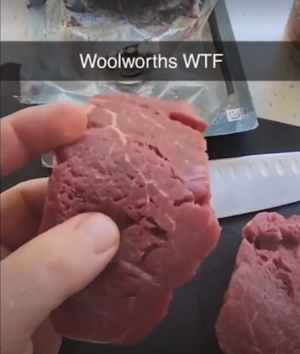Woolworths responds after shopper’s ‘meat glue’ video reaches millions
By
KenAlunan
- Replies 12
In the age of social media, a single video can spark widespread debate and even controversy, as was the case with a recent viral sensation involving a Woolworths customer and a pair of eye fillet steaks.
The video, which has garnered millions of views, shows the shopper preparing his beef cuts and pointing out what appears to be a thin, clear substance between the meat's tissues.
The customer's claim? That the supermarket giant was selling 'glued' meat.
The term 'meat glue' might sound like something out of a science fiction novel, but it refers to transglutaminase, a food additive used to bind proteins together. It's often used in food manufacturing to improve the texture and appearance of processed meats.
While this ingredient is approved for use in Australia, it has been associated with an increased risk of bacterial contamination and may exacerbate symptoms for those with coeliac disease or gluten sensitivity.
However, Woolworths was quick to respond to the allegations, assuring customers that their steaks are sold whole and that the substance observed was not, in fact, meat glue.
'We pride ourselves on providing high-quality meat to our customers and we can confirm our steaks are whole muscle,' a spokesperson for Woolworths said.
They explained that eye fillet steak is a particularly lean cut with minimal connective tissue, which contributes to its tenderness and ease of separation when pressure is applied.
The eye fillet, also known as tenderloin steak or fillet mignon, is sourced from the loin section of the animal and is renowned for its tenderness, mild flavour, and lack of fat marbling. It's a cut that's highly valued by chefs and home cooks alike, often commanding a higher price due to its quality.
The viral video sparked a flurry of comments from viewers, many of whom were quick to point out the customer may have been wrong in calling out Woolworths.
Experienced butchers and meat industry professionals weighed in, with one stating, 'I've been a butcher for 45 years that is not meat glue,' and another adding, 'In my 25 years of butchering, that's how eye fillet looks.'
The consensus among these experts was clear: what the video showed was simply the natural appearance of the meat's muscle fibres, not evidence of tampering.
This isn't the first time Woolworths has faced accusations of using meat glue. In 2021, another shopper claimed to have been 'ripped off' after purchasing what they believed to be glued-together offcuts.
Woolworths denied these claims as well, and the topic has continued to be a subject of discussion online.
 This incident serves as a reminder of the importance of understanding what we're buying, especially when it comes to food.
This incident serves as a reminder of the importance of understanding what we're buying, especially when it comes to food.
It's also a testament to the power of social media and how quickly misinformation can spread.
When in doubt, it's always best to consult with a professional—in this case, your local butcher—who can provide expert insight into the quality of the meat you're purchasing.
Has all this talk of steak gotten you hungry? Check out these tips on how to cook a good steak from our member @Suzanne rose!
Have you ever encountered something unusual in your supermarket meat purchases? How did you handle it? Let us know below!
The video, which has garnered millions of views, shows the shopper preparing his beef cuts and pointing out what appears to be a thin, clear substance between the meat's tissues.
The customer's claim? That the supermarket giant was selling 'glued' meat.
The term 'meat glue' might sound like something out of a science fiction novel, but it refers to transglutaminase, a food additive used to bind proteins together. It's often used in food manufacturing to improve the texture and appearance of processed meats.
While this ingredient is approved for use in Australia, it has been associated with an increased risk of bacterial contamination and may exacerbate symptoms for those with coeliac disease or gluten sensitivity.
However, Woolworths was quick to respond to the allegations, assuring customers that their steaks are sold whole and that the substance observed was not, in fact, meat glue.
'We pride ourselves on providing high-quality meat to our customers and we can confirm our steaks are whole muscle,' a spokesperson for Woolworths said.
They explained that eye fillet steak is a particularly lean cut with minimal connective tissue, which contributes to its tenderness and ease of separation when pressure is applied.
The eye fillet, also known as tenderloin steak or fillet mignon, is sourced from the loin section of the animal and is renowned for its tenderness, mild flavour, and lack of fat marbling. It's a cut that's highly valued by chefs and home cooks alike, often commanding a higher price due to its quality.
The viral video sparked a flurry of comments from viewers, many of whom were quick to point out the customer may have been wrong in calling out Woolworths.
Experienced butchers and meat industry professionals weighed in, with one stating, 'I've been a butcher for 45 years that is not meat glue,' and another adding, 'In my 25 years of butchering, that's how eye fillet looks.'
The consensus among these experts was clear: what the video showed was simply the natural appearance of the meat's muscle fibres, not evidence of tampering.
This isn't the first time Woolworths has faced accusations of using meat glue. In 2021, another shopper claimed to have been 'ripped off' after purchasing what they believed to be glued-together offcuts.
Woolworths denied these claims as well, and the topic has continued to be a subject of discussion online.
Key Takeaways
- Woolworths has responded to a viral video alleging their eye fillet steaks were 'glued' together, denying the use of 'meat glue' in their products.
- The video, which claimed to show separate cuts stuck together, was explained by Woolworths to be a misunderstanding, noting that eye fillet steak, or tenderloin, naturally pulls apart due to minimal connective tissue.
- Experts and butchers chimed in on the video, with many agreeing that the substance in question was not meat glue but rather the small amount of fat in the lean cut of meat.
- This is not the first time Woolworths has faced accusations of using meat glue, with similar claims debunked in the past, and the retailer maintains the quality and integrity of their steaks.
It's also a testament to the power of social media and how quickly misinformation can spread.
When in doubt, it's always best to consult with a professional—in this case, your local butcher—who can provide expert insight into the quality of the meat you're purchasing.
Has all this talk of steak gotten you hungry? Check out these tips on how to cook a good steak from our member @Suzanne rose!
Have you ever encountered something unusual in your supermarket meat purchases? How did you handle it? Let us know below!








